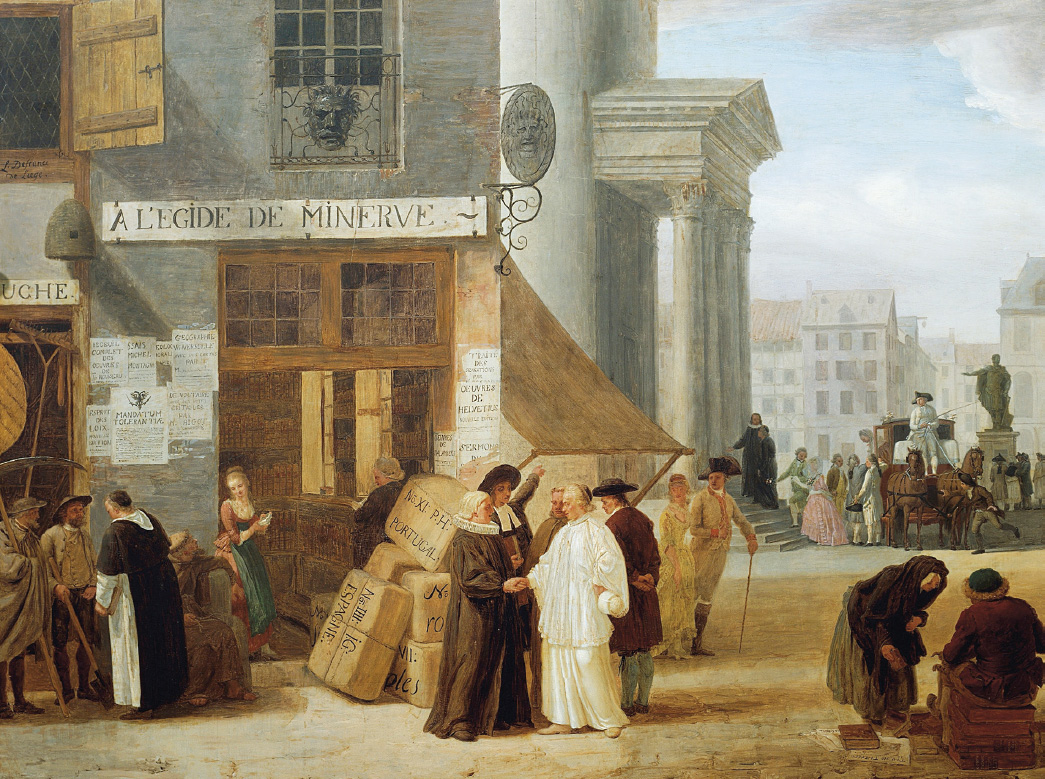A History of Western Society: Printed Page 522
A History of Western Society, Value Edition: Printed Page 537
Urban Culture and Life in the Public Sphere
Enlightenment ideas did not float on thin air. A series of new institutions and practices encouraged the spread of enlightened ideas in the late seventeenth and eighteenth centuries. First, the European production and consumption of books grew significantly. In Germany, for example, the number of new titles appearing annually rose from roughly six hundred in 1700 to twenty-six hundred in 1780. Moreover, the types of books people read changed dramatically. The proportion of religious and devotional books published in Paris declined after 1750; history and law held constant; the arts and sciences surged.
Reading more books on many more subjects, the educated public approached reading in a new way. The result was what some scholars have called a reading revolution. The old style of reading in Europe had been centered on a core of sacred texts that taught earthly duty and obedience to God. Reading had been patriarchal and communal, with the father slowly reading the text aloud to his assembled family. Now reading involved a broader field of books that constantly changed. Reading became individual and silent, and texts could be questioned. Subtle but profound, the reading revolution ushered in new ways of relating to the written word.
Conversation, discussion, and debate also played a critical role in the Enlightenment. Evolving from the gatherings presided over by the précieuses in the late seventeenth century, the salon was a regular meeting held in the elegant private drawing rooms (or salons) of talented, wealthy men and women. There they encouraged the exchange of witty observations on literature, science, and philosophy among great aristocrats, wealthy middle-class financiers, high-ranking officials, and noteworthy foreigners. Many of the most celebrated salons were hosted by women, known as salonnières (sah-lahn-ee-EHRZ), such as Madame du Deffand, whose weekly Parisian salon included such guests as Montesquieu, d’Alembert, and Benjamin Franklin, then serving as the first U.S. ambassador to France. Invitations to salons were highly coveted; introductions to the rich and powerful could make the career of an ambitious writer, and, in turn, the social elite found amusement and cultural prestige in their ties to up-and-coming artists and men of letters. (See “Primary Source 16.4: Enlightenment Culture.”)

The salon thus represented an accommodation between the ruling classes and the leaders of Enlightenment thought. Salons were sites in which the philosophes, the French nobility, and the prosperous middle classes intermingled and influenced one another while maintaining due deference to social rank. Critical thought about almost any question became fashionable and flourished alongside hopes for human progress through greater knowledge and enlightened public opinion.
Elite women also exercised great influence on artistic taste. Soft pastels, ornate interiors, sentimental portraits, and starry-eyed lovers protected by hovering cupids were all hallmarks of the style they favored. This style, known as rococo (ruh-KOH-koh), was popular throughout Europe in the period from 1720 to 1780. It has been argued that feminine influence in the drawing room went hand in hand with the emergence of polite society and the general attempt to civilize a rough military nobility. Similarly, some philosophes championed greater rights and expanded education for women, claiming that the position and treatment of women were the best indicators of a society’s level of civilization and decency.10 For these male philosophes, greater rights for women did not mean equal rights, and the philosophes were not particularly disturbed by the fact that elite women remained legally subordinate to men in economic and political affairs. Elite women lacked many rights, but so did the majority of European men, who were poor.
While membership at the salons was restricted to the wellborn, the well connected, and the exceptionally talented, a number of institutions provided the rest of society with access to Enlightenment ideas. Lending libraries served an important function for people who could not afford their own books. The coffeehouses that first appeared in the late seventeenth century became meccas of philosophical discussion. (See “Living in the Past: Coffeehouse Culture.”) In addition to these institutions, book clubs, debating societies, Masonic lodges (groups of Freemasons, a secret society that accepted craftsmen and shopkeepers as well as middle-class men and nobles), and newspapers all played roles in the creation of a new public sphere that celebrated open debate informed by critical reason. The public sphere was an idealized space where members of society came together as individuals to discuss issues relevant to the society, economics, and politics of the day.
What of the common people? Did they participate in the Enlightenment? Enlightenment philosophes did not direct their message to peasants or urban laborers. They believed that the masses had no time or talent for philosophical speculation and that elevating them would be a long and potentially dangerous process. Deluded by superstitions and driven by violent passions, the people, they thought, were like children in need of firm parental guidance. D’Alembert characteristically made a sharp distinction between “the truly enlightened public” and “the blind and noisy multitude.”11 Despite these prejudices, the ideas of the philosophes did find an audience among some members of the common people. At a time of rising literacy, book prices were dropping and many philosophical ideas were popularized in cheap pamphlets and through public reading. Although they were barred from salons and academies, ordinary people were not immune to the new ideas in circulation.